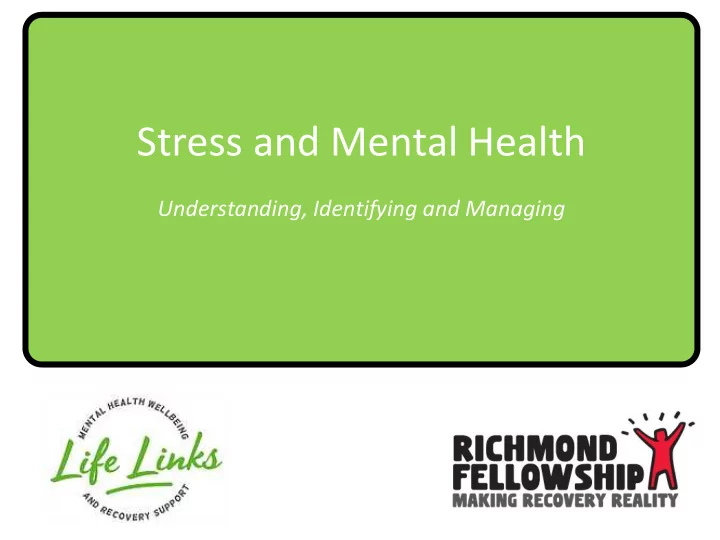

Stress and Mental Health Understanding, Identifying and Managing
Introductions We are…
Outcomes of the Session • Build our awareness of mental health • Define stress and identify its signs • Understand the causes of stress • Learn some ways of managing stress • Know what services are available to help
Mental Health ‘Mental Health Problems’ ‘Psychological Wellbeing’ • Depression • Optimism • Anxiety • Happiness • Schizophrenia • Flourishing • Obsessive Compulsive Disorder • Quality of life • Personality Disorders • Social Connectedness Illness Approach Wellness Approach
Defining Stress “A state of mental or emotional strain or tension… resulting from adverse or demanding circumstances” Oxford English Dictionary
Stress and Performance
Defining Stress Mental Stress Health Problems
Defining Stress Mental Stress Lack of Health coping resources Problems
‘Sickness’ Stress Stress
Recognising ‘Sickness’ Stress
‘Sickness’ Stress If you suffer with a mental health problem, such as anxiety or depression, seek help from your GP.
Causes of Stress Stress
“Demands” • Low self-esteem • Work or study • Financial issues • Lack of planning • Relationship issues • Parental/carer • Drug and alcohol use responsibilities • • Health issues Bereavement
Managing Stress - Proactive Managing Stress Use the acronym ‘PLEASE master’ • PL treat Physical illness • E Eat healthily • A Avoid mood-altering substances (alcohol or drugs) • S Sleep well • E Exercise • Master - plan and do something every day that gives you a sense of achievement or ability
Managing Stress - Proactive Wellbeing Studying Finances
Managing Stress - Reactive Higher Stress (physical reactions) Lower Stress (mind reactions)
Getting Help Stress
When to seek help When you have tried the above management strategies If you are struggling with responsibilities If you are struggling with your mood Whenever you feel you need help
Where to seek help • Family and friends • Work colleagues • Life Links & Partners • Samaritans/Other listening services • Apps • Support groups
Summary • Stress is not always bad (it’s what we do with it) • Keep an eye out for ‘early warning signs’ • Make sure we look after ourselves • We don’t need to suffer alone – support is available
Thank you for listening You can speak to us at the end if you prefer
Recommend
More recommend